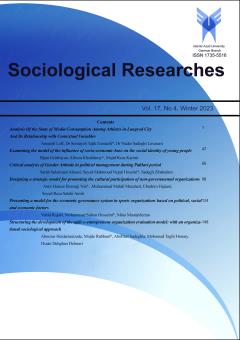Critical analysis of gender attitude in political management during Pahlavi period
Subject Areas :
Sara Soleimani Ahoyi
1
,
Seyed Mahmoud Nejati Hosseini
2
*
,
Sadegh Zibakalam
3
![]()
1 - PhD student in the field of Political Science-Political Sociology, Faculty of Law, Theology and Political Science, Science and Research Unit, Islamic Azad University, Tehran, Iran
2 - Assistant Professor, Department of Social Sciences, Faculty of Humanities, Ashtian Branch, Islamic Azad University, Ashtian, Iran
3 - Professor, Department of Law and Political Science, Faculty of Law and Political Science, University of Tehran, Tehran, Iran
Keywords: : Political management, gender, modernity, patriarchy, critical analysis,
Abstract :
he political management of women and men is the result of the reproduction of inequalities in which governments play an important role and has a determining feature for the ruling discourses, and women are always the other and the identity maker for men and the factor determining power and authority. The purpose of this article is to identify the obstacles of women in political management. During the Pahlavi era, with emphasis on the text of Mohammad Reza Pahlavi's books and speeches. The research results show that in the modernism of the Pahlavi era, the secularization of the society was carried out on several fronts, the judicial structure was modernized and the new educated lawyers replaced the traditional clerical judges and... in this period, women entered the political literature of Iran for the first time and With the development of basic education as well as higher education for women, the ground for their participation in political and social activities was provided, and women entered the field of political management in political roles such as representing the National Assembly, the Senate, as a minister, and as a judge. This opportunity happened to a certain class of women, and despite the modernization of society, a large part of the society had a traditional attitude and did not participate in these changes. On the other hand, the expected achievements of modernism in western societies, such as feminism, were opposed by the government and ideological definitions were presented for feminism.

